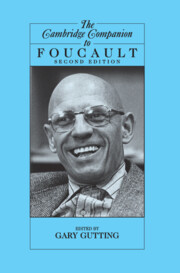Book contents
- Frontmatter
- Introduction Michel Foucault: A User’s Manual
- 1 Foucault’s Mapping of History
- 2 Foucault and the History of Madness
- 3 The Death of Man, or Exhaustion of the Cogito?
- 4 Power/Knowledge
- 5 Ethics as Ascetics: Foucault, the History of Ethics, and Ancient Thought
- 6 Michel Foucault’s Ethical Imagination
- 7 The Analytic of Finitude and the History of Subjectivity
- 8 Foucault’s Encounter with Heidegger and Nietzsche
- 9 Foucault and Habermas
- 10 Foucault’s Relation to Phenomenology
- 11 Against Interiority: Foucault’s Struggle with Psychoanalysis
- 12 Foucault’s Modernism
- 13 Queering Foucault and the Subject of Feminism
- Bibliography
- Addendum to Bibliography, 1993–2005
- Index
12 - Foucault’s Modernism
Published online by Cambridge University Press: 28 August 2006
- Frontmatter
- Introduction Michel Foucault: A User’s Manual
- 1 Foucault’s Mapping of History
- 2 Foucault and the History of Madness
- 3 The Death of Man, or Exhaustion of the Cogito?
- 4 Power/Knowledge
- 5 Ethics as Ascetics: Foucault, the History of Ethics, and Ancient Thought
- 6 Michel Foucault’s Ethical Imagination
- 7 The Analytic of Finitude and the History of Subjectivity
- 8 Foucault’s Encounter with Heidegger and Nietzsche
- 9 Foucault and Habermas
- 10 Foucault’s Relation to Phenomenology
- 11 Against Interiority: Foucault’s Struggle with Psychoanalysis
- 12 Foucault’s Modernism
- 13 Queering Foucault and the Subject of Feminism
- Bibliography
- Addendum to Bibliography, 1993–2005
- Index
Summary
More than simply an event that affected our emotions that gave rise to the fear of nothingness, the death of God profoundly influenced our language; at the source of language it placed a silence that no work, unless it be pure chatter, can mask. Language thus assumes a sovereign position; it comes to us from elsewhere, from a place of which no one can speak, but it can be transformed into a work only if, in ascending to its proper discourse, it directs its speech toward this absence. In this sense, every work is an attempt to exhaust language; eschatology has become of late a structure of literary experience, and literary experience, by right of birth, is now of paramount importance.
Michel Foucault, “Le ‘non’ du père”MODERNISM
The word “modernism” is most often used as a covering term for the period of Western literary and artistic innovation that extends from the late nineteenth century until about the 1960s, although arguably it is a conceptually more complex and open-ended phenomenon - a type of historical disposition (which might condition philosophy or politics as well as art) characterized by a belief in the inevitable and even desirable obsolescence of human traditions, institutions, and conventions, and perhaps even the concept of the human itself. Nietzsche's name comes to mind. In fact as a concept “modernism” has seldom been adequately clarified. The International Review of Modernism urges the method of “thick description” as an approach to the subject because modernism is made of heterogeneous cultural practices invisible to views from above. As Fredric Jameson says, modernism is not so much a concept as it is a “narrative category” in which topics like nineteenth-century realism, self-reflexive language, and the impersonality of the artist get articulated and rearticulated in multifarious ways. It is certainly the case that modernism is defined more often by examples than by theories - serial music, nonlinear writings like Gertrude Stein's Tender Buttons, antiaesthetic objects like Marcel Duchamp's Fountain, as well as avantgarde groups like the Surrealists whose aim was often less to produce works of art than to develop new forms of experience and new dimensions of human subjectivity. In English the term “high modernism” is reserved for overshadowing monuments like Joyce's Ulysses and Pound's Cantos. I'm not sure there is a corresponding term among the French, who are apt to take their guidance less from Proust's Grand CEuvre than from the theater visionary Antonin Artaud, who thought that the task of the artist is not to produce masterpieces but to set in motion processes that dislocate rational, integrated, or otherwise settled forms of consciousness. On a certain view modernism is made of events, not of works. A museum of modern art might arguably count as a defeat of modernism.
- Type
- Chapter
- Information
- The Cambridge Companion to Foucault , pp. 348 - 378Publisher: Cambridge University PressPrint publication year: 2005
- 4
- Cited by



